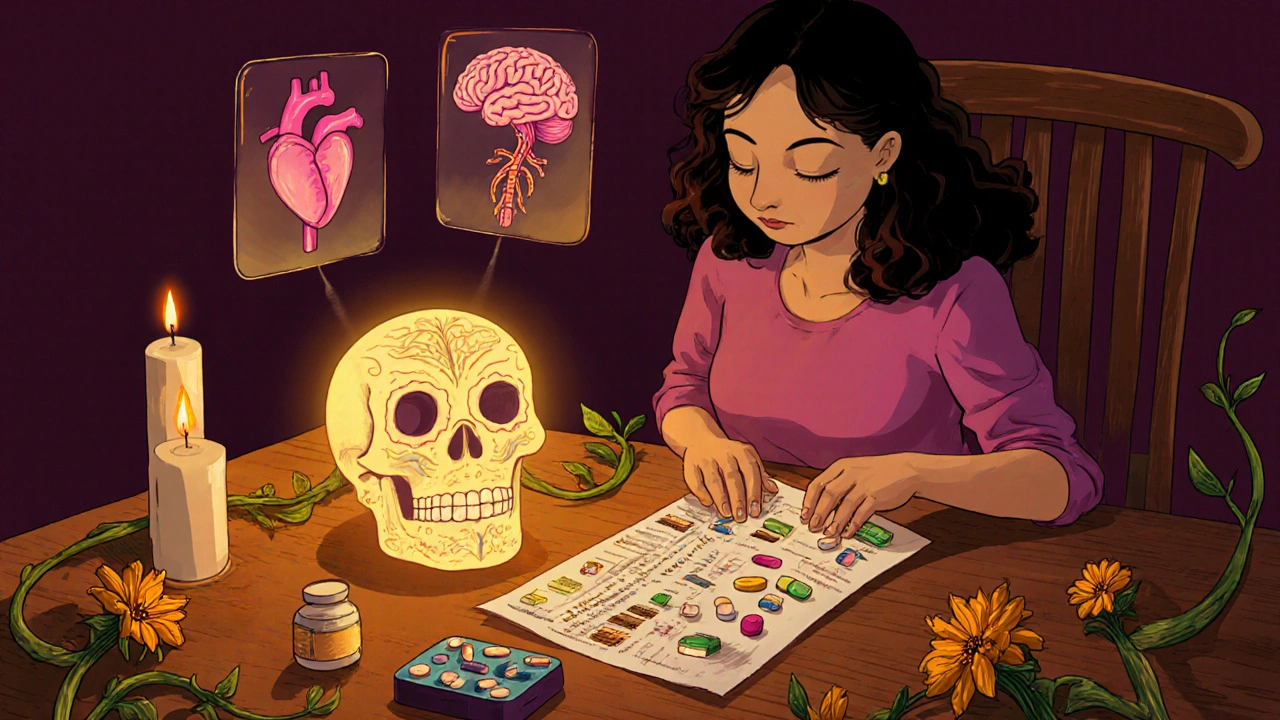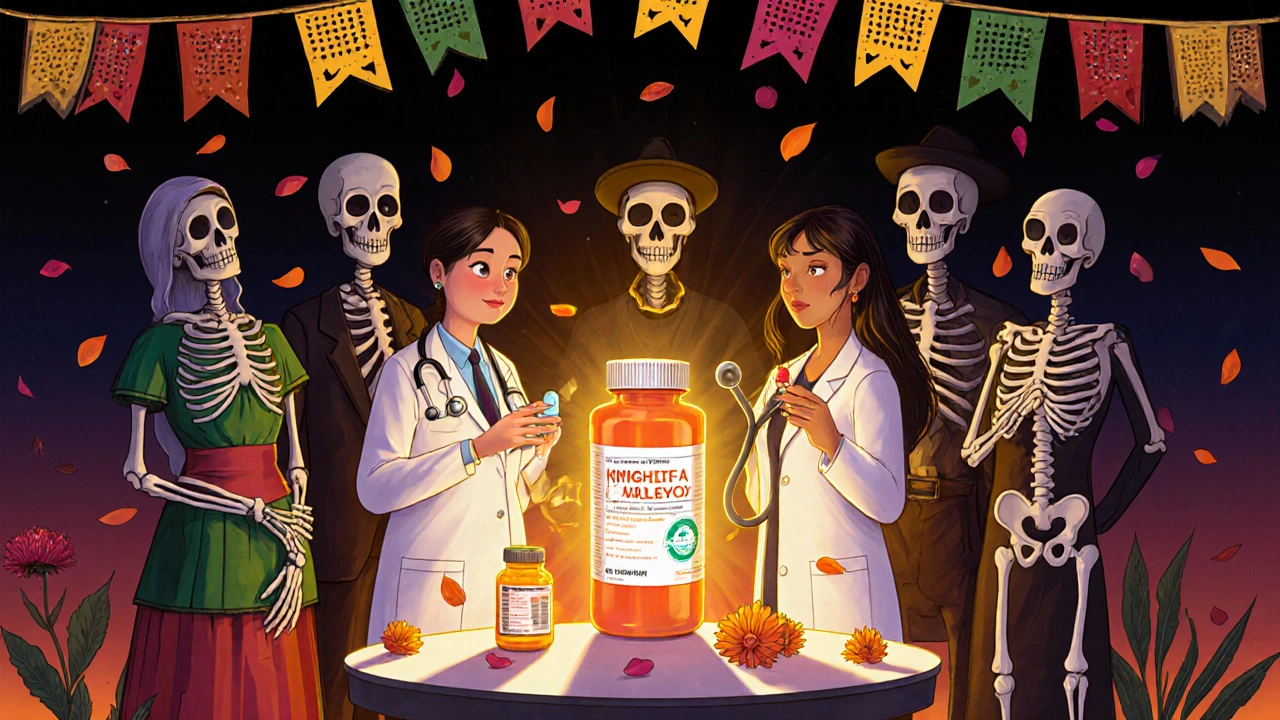How to Create a Medication Plan Before Conception for Safety
 Nov, 19 2025
Nov, 19 2025
Most women don’t realize that the first eight weeks of pregnancy are the most dangerous time for a developing baby - not because of anything they do after they find out they’re pregnant, but because of what they were already taking before they knew they were pregnant. By the time a missed period triggers a pregnancy test, the baby’s heart, brain, spine, and limbs have already formed. If a medication you’re taking crosses the placenta during those early days, it could cause serious birth defects. That’s why creating a medication plan before conception isn’t just a good idea - it’s essential.
Why Timing Matters More Than You Think
You don’t need to wait until you’re trying to get pregnant to think about your meds. If you’re a woman of childbearing age and you take any prescription, over-the-counter, or herbal product regularly, you’re already in the window where a surprise pregnancy could put your future baby at risk. Nearly half of all pregnancies in the U.S. are unintended, according to the American College of Obstetricians and Gynecologists (ACOG). That means for a lot of women, the first exposure to a potential teratogen - a substance that can cause birth defects - happens before they even know they’re pregnant. The critical period? Weeks 3 to 8 after your last period. That’s when the embryo’s organs are forming. A drug like valproic acid, used for seizures or bipolar disorder, can increase the risk of major birth defects by up to 10 times during this time. Lithium, often prescribed for mood disorders, raises the chance of a rare heart defect called Ebstein’s anomaly. Even common drugs like isotretinoin (Accutane) for acne can cause severe malformations if taken during early pregnancy. The good news? You have time to fix this - if you start now.Step 1: List Every Medication You Take
This isn’t just about your prescriptions. You need to include:- All prescription drugs (even if you’ve been on them for years)
- Over-the-counter pain relievers, cold meds, or sleep aids
- Vitamins, supplements, and herbal remedies (like St. John’s wort or black cohosh)
- Topical treatments (creams, patches, eye drops)
- Recreational substances (alcohol, nicotine, cannabis)
Step 2: Identify High-Risk Medications and Their Alternatives
Not all meds are created equal when it comes to pregnancy safety. Some are outright dangerous. Others can be swapped for safer versions. Here’s what to watch for:- Valproic acid (Depakote) - Avoid completely. Linked to neural tube defects, facial deformities, and lower IQ in children.
- Lithium - Can cause heart defects. May be replaced with lamotrigine or other mood stabilizers under specialist care.
- Methotrexate - Used for rheumatoid arthritis or psoriasis. Highly teratogenic. Must be stopped at least 3 months before trying to conceive.
- ACE inhibitors (like lisinopril) - Can cause kidney damage and fetal death. Switch to methyldopa or labetalol.
- Warfarin - Crosses the placenta and can cause fetal warfarin syndrome. Switch to low-molecular-weight heparin (like enoxaparin), which doesn’t.
- Isotretinoin - Must be discontinued at least 1 month before conception, and you must use two forms of birth control during treatment.
Step 3: Start Folic Acid - But Get the Right Dose
Folic acid is the one supplement every woman planning pregnancy should take - but not everyone needs the same amount.- If you’re healthy and have no risk factors: 400-800 mcg daily. This reduces neural tube defect risk by up to 70%.
- If you have epilepsy, diabetes, obesity, or a previous child with a neural tube defect: 4-5 mg daily. That’s five times the standard dose.
- If you’re on antiseizure meds like valproic acid or carbamazepine: 5 mg daily is non-negotiable. These drugs interfere with folic acid absorption.

Step 4: Manage Chronic Conditions Before Pregnancy
If you have a long-term health condition, your preconception plan must include stabilizing it.- Thyroid disease: Your TSH level should be under 2.5 mIU/L before conception. Once pregnant, your levothyroxine dose will likely need to increase by 30%. Untreated hypothyroidism raises miscarriage risk by 60%.
- Diabetes: Aim for an HbA1c under 6.5% before trying to conceive. High blood sugar during early pregnancy increases the risk of heart defects and miscarriage.
- Autoimmune diseases: Conditions like lupus or rheumatoid arthritis need to be in remission. Avoid methotrexate, cyclophosphamide, and leflunomide. Sulfasalazine and hydroxychloroquine are generally safe.
- HIV: Your viral load must be undetectable (under 50 copies/mL) before conception. Modern antiretrovirals can reduce mother-to-child transmission to less than 1%.
- Obesity: Losing even 5-10% of body weight improves fertility and reduces risks like gestational diabetes and preeclampsia. Avoid weight-loss drugs like liraglutide - they haven’t been studied in pregnancy.
Step 5: Plan for Medication Washout Periods
Some drugs stick around in your system longer than you think. Stopping them isn’t enough - you need to wait.- Methotrexate: Wait 3 months (3 full menstrual cycles) after your last dose.
- Leflunomide: Requires a special washout procedure (cholestyramine) and a 2-month wait.
- Isotretinoin: Must be stopped at least 1 month before conception, and you must use two forms of birth control during treatment.
- Antidepressants: Some, like fluoxetine, stay in your system for weeks. Talk to your doctor about switching to a shorter-acting option if needed.
Step 6: Coordinate With Your Care Team
No single doctor can handle everything. You need a team:- OB/GYN: Leads your preconception visit, coordinates care.
- Pharmacist: Reviews all meds for interactions and pregnancy safety. Many offer free preconception consultations.
- Specialist: Neurologist (for seizures), endocrinologist (for thyroid/diabetes), rheumatologist (for lupus), psychiatrist (for mood disorders).
- Genetic counselor: If you or your partner have a family history of birth defects or genetic disorders.

What About Birth Control?
If you’re on a medication that’s unsafe in pregnancy, you need reliable birth control until you’re ready. But here’s the catch: some meds reduce birth control effectiveness.- Antiseizure drugs like carbamazepine, phenytoin, and topiramate can make hormonal birth control fail.
- Antibiotics like rifampin and some HIV meds also interfere.
What If You’re Already Pregnant?
If you’re already pregnant and haven’t reviewed your meds, don’t panic. Stop taking anything that isn’t approved by your doctor - but don’t stop meds abruptly if you have a chronic condition. Seizures, high blood pressure, or untreated depression can be just as dangerous as a medication. Call your OB/GYN or a teratogen information service (like MotherToBaby) right away. They can tell you if your meds are risky and what to do next. Many women worry about stopping meds during pregnancy - but the bigger risk is uncontrolled illness.Why So Many Women Miss This Step
Only 38% of women with chronic conditions get a preconception medication review, according to CDC data. Why? Doctors don’t always bring it up. Many assume a woman isn’t planning pregnancy. Others don’t have time in a 15-minute visit. And many women don’t realize they need to plan ahead. But the data is clear: women who get preconception counseling have 28% fewer major birth defects. That’s not a small number. That’s thousands of babies spared from lifelong challenges.Final Checklist: Your Preconception Medication Plan
Before you stop using birth control, make sure you’ve done these:- Written a full list of all medications, supplements, and herbs you take.
- Reviewed each with your doctor or pharmacist - especially for teratogenic risk.
- Switched high-risk drugs to safer alternatives (if needed).
- Started the correct dose of folic acid (400 mcg-5 mg daily).
- Optimized control of chronic conditions (thyroid, diabetes, epilepsy, etc.).
- Allowed enough time for drug washout periods (3-6 months).
- Set up a care team: OB/GYN, specialist, pharmacist.
- Confirmed your birth control method won’t fail due to your meds.
Can I keep taking my antidepressants if I’m trying to get pregnant?
Some antidepressants are safer than others during pregnancy. SSRIs like sertraline and citalopram are generally considered low-risk and are often continued if needed. However, paroxetine should be avoided due to a small increased risk of heart defects. Never stop antidepressants suddenly - talk to your psychiatrist and OB/GYN to create a safe plan. Untreated depression can increase risks like preterm birth and low birth weight.
Is it safe to take prenatal vitamins before I’m pregnant?
Yes - and you should. Prenatal vitamins are designed for preconception use. They contain the right amount of folic acid, iron, and other nutrients your body needs before and during early pregnancy. Choose one with at least 400 mcg of folic acid. Avoid supplements with excessive vitamin A (retinol), which can be toxic in high doses.
What if I’m on a medication that has no known safety data in pregnancy?
Many newer medications lack long-term pregnancy data. In these cases, your doctor will weigh the risk of stopping the drug against the unknown risk of continuing it. For serious conditions like cancer or organ transplant rejection, continuing the medication may be safer than stopping. Always consult a maternal-fetal medicine specialist or a teratogen information service like MotherToBaby before making a decision.
Do I need to stop my supplements before getting pregnant?
Some supplements are safe, others aren’t. Avoid high-dose vitamin A, vitamin E (over 400 IU), and herbal products like black cohosh, dong quai, or saw palmetto - they can interfere with hormones or cause contractions. Stick to prenatal vitamins and basic supplements like vitamin D or omega-3s (if recommended). Always disclose everything you’re taking - even if you think it’s harmless.
How do I know if a medication is safe during pregnancy?
The old A-X pregnancy categories are outdated. Today, the FDA requires detailed pregnancy and lactation labeling with subsections for risk summaries, clinical considerations, and data. Look for labels that say “no increased risk” or “animal studies show no risk.” The best resource is MotherToBaby or your pharmacist. Never rely on internet forums or anecdotal advice.
If you’re planning a pregnancy, your medication plan is your first line of defense. It’s not about fear - it’s about control. By taking these steps now, you’re not just protecting your baby’s health - you’re giving them the best possible start.
Lemmy Coco
November 19, 2025 AT 21:09i just found out my doc never told me to stop my ibuprofen before trying... like wtf? i’ve been taking it for migraines for years. i’m gonna print this out and hand it to him next visit. also folic acid? i thought that was just for vegans. 🤦♂️
rob lafata
November 20, 2025 AT 18:35Oh please. You people act like every pill is a nuclear bomb. I took lithium while pregnant and my kid’s now a Harvard grad. You’re scaring women into not having kids because some pharma bro wrote a 12-page PDF. The real teratogen? Fearmongering. Also, who the hell uses ‘teratogen’ in casual conversation? You sound like a med student trying to impress their crush.
Matthew McCraney
November 21, 2025 AT 13:12They’re lying. All of it. The CDC? ACOG? MotherToBaby? All controlled by Big Pharma to sell more prenatal vitamins and push abortion. I know a woman who took Accutane and had a healthy baby-she posted pics on Instagram. They don’t want you to know the truth. They want you scared, dependent, and paying for 17 different specialists. Also, folic acid is just a placebo. I took apple cider vinegar instead and my twins are perfect. 🤫
Rusty Thomas
November 23, 2025 AT 02:43OMG I JUST REALIZED I’VE BEEN TAKING ST. JOHN’S WORT FOR 3 YEARS AND I’M TRYING TO GET PREGNANT 😭😭😭 I’M SO STUPID. I thought herbal = safe. I’m literally gonna cry in the shower. Also, my mom says I should just ‘pray and trust God’ but I don’t think God wants my baby to have a cleft palate. 😔🙏
serge jane
November 23, 2025 AT 16:30There’s an underlying assumption here that pregnancy is an event to be managed rather than a natural process to be honored. We’ve turned fertility into a compliance checklist where every molecule must be vetted by a board-certified specialist. But what about intuition? What about the body’s innate wisdom? I’m not saying ignore science-but why does every woman need a 12-step medication audit before she can conceive? Isn’t there value in trusting biology over bureaucracy? I’m not anti-medication-I’m anti-anxiety. The fear of imperfection is poisoning the joy of creation.
Nick Naylor
November 25, 2025 AT 15:18Brianna Groleau
November 27, 2025 AT 10:05I’m from Colombia and we don’t have all this fancy preconception stuff here. My mom took aspirin while pregnant with me, ate street food, drank coffee, and I turned out fine. I’m a teacher, I have two kids, no birth defects. I think we’re overcomplicating this. Maybe the real issue is that we don’t trust women? We treat them like fragile glass dolls instead of strong, capable humans who’ve been having babies for thousands of years. I’m not saying ignore doctors-but don’t let fear make you feel like you’re doing something wrong if you didn’t plan perfectly. Love matters more than labels.
Dave Wooldridge
November 28, 2025 AT 21:14They’re tracking your meds through your phone. The app you use to track your cycle? It’s feeding data to the government. They’re building a database of women who take lithium or valproate so they can deny you insurance later. And folic acid? It’s not for your baby-it’s to mask the real damage caused by glyphosate in your food. I read a guy on 4chan who said the CDC uses folic acid to make birth defects less visible on ultrasounds. I’m not saying it’s true… but why won’t they release the raw data?
Rebecca Cosenza
November 29, 2025 AT 05:37I took sertraline while pregnant. My son is 7. He reads Shakespeare. I didn’t stop. I didn’t panic. I just talked to my doctor. You don’t need a spreadsheet. You need a good team. And maybe a little faith. 💕
swatantra kumar
November 30, 2025 AT 09:18Bro this is gold 🤯 I’m from India and here no one even knows what 'teratogen' means. My cousin took antiepileptic meds and had a baby-now he’s a chess champion. Maybe we need less fear, more trust? Also, folic acid? I just ate spinach. 🌿😂